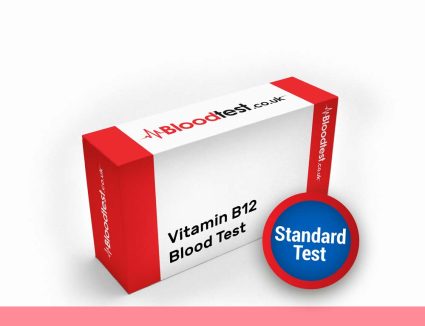Unveiling the Health Risks Linked to Vitamin B12 Deficiency
Understanding the Importance of Vitamin B12 for Optimal Health

The Vitamin B12 Blood Test in Skegness is essential for identifying levels of this crucial nutrient. Vitamin B12 is a vital, water-soluble vitamin that plays a significant role in preserving nerve function and promoting the formation of red blood cells. This indispensable nutrient is fundamental to overall health, and insufficient amounts can result in severe health complications. Primarily sourced from animal-based foods such as fish, meat, eggs, and dairy products, Vitamin B12 is renowned for its role in DNA synthesis as well as cellular metabolism. It is also crucial for regenerating red blood cells, essential for the transportation of oxygen throughout the body, thus aiding in the prevention of anaemia. Additionally, this vitamin is important for cognitive health, facilitating the formation of myelin, the protective covering around nerves, which is necessary for effective nerve signalling. Due to its diverse roles in numerous bodily processes, a deficiency in Vitamin B12 can severely affect health, leading to symptoms such as fatigue, weakness, and various neurological disorders.
Would You Like to Hear More on This Subject?
 Identifying the Primary Symptoms of Vitamin B12 Deficiency
Identifying the Primary Symptoms of Vitamin B12 Deficiency
The symptoms and signs of a Vitamin B12 deficiency can appear in various forms, often leading to considerable disruptions in everyday life. Frequently experienced symptoms include extreme fatigue, weakness, and pale skin, as the body struggles to generate sufficient red blood cells. Neurological issues are also prevalent, with symptoms ranging from tingling sensations in the extremities to cognitive problems like memory loss and fluctuations in mood. If these symptoms remain unaddressed, they could worsen, potentially culminating in severe health consequences such as irreversible nerve damage or cognitive decline. It is vital for those experiencing these symptoms, particularly those within at-risk groups, to arrange a Vitamin B12 blood test in Skegness to swiftly identify any deficiencies and commence appropriate treatment.
Identifying Populations at Higher Risk for Vitamin B12 Deficiency
Certain demographics demonstrate a heightened vulnerability to Vitamin B12 deficiency, highlighting the need for greater awareness and regular screening. The elderly are often at an increased risk due to reduced absorption capabilities and restrictive dietary patterns. Likewise, vegetarians and vegans are particularly susceptible since Vitamin B12 is predominantly found in animal-derived foods. Furthermore, individuals with specific health conditions such as pernicious anaemia, various gastrointestinal disorders, or those who have undergone certain surgical interventions may find it challenging to absorb this essential nutrient effectively. Recognising these risk factors is crucial for implementing preventive strategies and ensuring that at-risk individuals receive adequate screening and potential supplementation.
The Essential Role of Vitamin B12 Testing in Health Maintenance

The Importance of Regular Vitamin B12 Level Testing
Regular testing for Vitamin B12 is indispensable for the early detection of deficiencies, which is critical in averting serious health complications. Early identification enables timely interventions that can greatly enhance health outcomes. Through a straightforward blood test, healthcare professionals can evaluate the levels of this essential nutrient, leading to informed, personalised treatment plans tailored to individual health requirements. Consistent testing acts as a proactive measure to ensure optimal health for those exhibiting symptoms or belonging to high-risk categories. Moreover, being aware of one’s Vitamin B12 status empowers individuals to take control of their health, facilitating informed decisions regarding their diet, lifestyle changes, and necessary supplementation.
Optimal Timing for Scheduling Your Vitamin B12 Test
Individuals should contemplate booking a Vitamin B12 blood test in Skegness if they exhibit signs of deficiency or belong to high-risk categories, including the elderly, vegetarians, or those with pre-existing health conditions. Annual testing is recommended for at-risk individuals, allowing for ongoing monitoring of Vitamin B12 levels. It is essential to consult with a healthcare professional to ascertain the appropriate frequency of testing based on personal health status and dietary habits. Recognising early deficiency signs can facilitate quicker treatment and contribute to better overall health management.
Decoding Your Vitamin B12 Test Results

Understanding and interpreting your Vitamin B12 test results is vital for effective health management. Standard Vitamin B12 levels typically range from 190 to 950 picograms per millilitre (pg/mL), with variations contingent on individual factors. Low levels may suggest a deficiency, while excessively elevated levels could indicate underlying health issues or over-supplementation. It is advisable to discuss your results with a healthcare professional, who can clarify the implications of your Vitamin B12 status and recommend necessary actions, whether through dietary adjustments, supplementation, or further testing.
Accessing Reliable Vitamin B12 Testing Services in Skegness
Finding Local Healthcare Providers Offering Vitamin B12 Testing
In Skegness, numerous healthcare providers facilitate convenient access to Vitamin B12 testing services. Local GP practices and clinics are equipped to perform blood tests, ensuring that residents can easily monitor their Vitamin B12 levels. Facilities such as the Skegness Medical Centre offer essential healthcare services, including blood tests, within a friendly atmosphere. Additionally, pharmacies and private testing services in the vicinity may provide quick and accessible testing options, enabling individuals to receive results without delay. With a variety of options available, residents are encouraged to explore local resources to facilitate effective health monitoring.
Steps for Scheduling Your Vitamin B12 Test
Arranging your Vitamin B12 test in Skegness is a simple procedure aimed at ensuring a seamless patient experience. Individuals can typically schedule appointments through their local GP surgery, either via telephone or online, providing straightforward access to testing services. Those opting for private testing may also discover online booking options that enable quick and flexible scheduling. It is crucial to prepare for your visit by reviewing any specific guidelines, such as fasting or medication considerations, to guarantee that the test produces accurate results.
Understanding Costs and Insurance Coverage for Vitamin B12 Testing
Gaining insights into the costs associated with a Vitamin B12 test in Skegness is essential for patients. Public healthcare services like the NHS typically cover testing for eligible individuals, particularly those displaying symptoms or belonging to at-risk groups. However, private testing services may charge fees that generally range from £30 to £80, depending on the facility and any additional services offered. It is vital to consult your health insurance provider to understand coverage options for blood tests, as many policies may include provisions for diagnostic testing, alleviating some financial burdens for patients seeking to monitor their Vitamin B12 levels.
Essential Preparations for Your Vitamin B12 Test
Critical Preparations Prior to Undergoing Your Vitamin B12 Test
Preparation for your Vitamin B12 test is essential to ensure accurate results. While fasting is typically not required for this particular blood test, it is advisable to consult your healthcare provider for any specific instructions that may apply to your situation. If you are taking any medications or supplements, it is crucial to inform your healthcare professional, as certain substances can impact test outcomes. Understanding these preparatory steps can help ease anxiety and ensure you are well-informed about what to expect during testing, ultimately leading to more reliable results.
What to Anticipate During the Vitamin B12 Testing Procedure
Undergoing a blood test can often be intimidating, but knowing what to expect can help ease your concerns. During your Vitamin B12 blood test in Skegness, a healthcare professional will use a small needle to draw blood, typically from your arm. This procedure is quick, usually taking only a few minutes. While some individuals may experience slight discomfort, the process is generally straightforward and safe. Once the sample is collected, it will be sent to a laboratory for analysis, allowing you to concentrate on your health without undue stress regarding the test itself.
Post-Test Care and Important Considerations
Post-test care is a vital aspect of the testing process. After your Vitamin B12 blood test in Skegness, it is advisable to rest briefly to ensure that you feel well before leaving the facility. While waiting for your results, maintaining hydration and a balanced diet can support your overall health. Results typically become available within a few days, so patience is essential. Should you experience any unusual symptoms following the test, such as excessive bruising or discomfort, do not hesitate to reach out to your healthcare provider for guidance and support.
Interpreting Your Test Results and Their Implications
Decoding the outcomes of your Vitamin B12 test is essential for understanding your health status. Low levels may indicate a deficiency that requires immediate intervention, while normal levels signify adequate Vitamin B12 status. If your results are abnormal, your healthcare provider can reassess your symptoms and discuss potential treatment options, including dietary modifications or supplementation. Understanding your test results empowers you to take control of your health, enabling informed decisions about the next steps and ongoing monitoring of your Vitamin B12 levels.
Recommended Follow-Up Actions After Receiving Your Test Results
Upon receiving your Vitamin B12 test results, it is crucial to undertake the appropriate follow-up actions. If a deficiency is confirmed, discussing treatment options with your healthcare provider is vital. This may entail dietary adjustments to include more Vitamin B12-rich foods such as meats, dairy products, and fortified cereals or considering supplements to address low levels. Regular follow-up tests are also advisable to monitor changes in your Vitamin B12 status, ensuring that the treatment plan remains effective and that your health continues on a positive trajectory. Seeking out local support groups in Skegness can also provide guidance and encouragement throughout this journey.
Your Action Plan Following Vitamin B12 Test Results
Effective Communication with Your Doctor Regarding Your Results
Engaging in open dialogue with your healthcare provider concerning your Vitamin B12 levels is essential for optimal health management. When discussing your results, be sure to mention any symptoms you’ve experienced and your dietary habits. This information will assist your doctor in tailoring a treatment plan that meets your specific needs. It is important to ask questions about any uncertainties surrounding your results, available treatment options, and potential side effects of supplements. A collaborative approach can empower you and your doctor to devise the best strategy to maintain healthy Vitamin B12 levels.
Exploring Treatment Options for Vitamin B12 Deficiency
Investigating potential treatment options for diagnosed Vitamin B12 deficiency in Skegness is vital for restoring optimal health. If dietary modifications prove insufficient, your healthcare provider may recommend Vitamin B12 injections or high-dose oral supplements to effectively replenish your levels. Individuals facing absorption challenges may require more frequent monitoring and ongoing treatments. The chosen treatment approach will be tailored to meet individual needs, ensuring that health goals are achieved while minimising potential side effects. Understanding these options can help alleviate anxiety and empower you to take proactive steps in managing your health effectively.
The Significance of Consistent Monitoring of Your Vitamin B12 Levels
Regular monitoring of your Vitamin B12 levels is essential for long-term health, particularly following treatment. Your healthcare provider may suggest follow-up tests at intervals tailored to your needs, allowing them to evaluate the effectiveness of your treatment plan. Keeping track of your levels helps in adjusting dietary habits or supplement dosages as necessary. Additionally, being proactive about your health and attending regular check-ups can aid in the early identification of any potential issues, ensuring that you maintain optimal Vitamin B12 levels and overall well-being.
Implementing Lifestyle Modifications for Enhanced Health
Adopting dietary and lifestyle changes can significantly assist in maintaining healthy Vitamin B12 levels post-treatment. Individuals should aim to incorporate a variety of Vitamin B12-rich foods into their diets, such as lean meats, dairy products, and fortified plant-based alternatives. For vegetarians and vegans, including fortified foods and supplements is crucial to prevent deficiencies. Furthermore, embracing a well-rounded diet abundant in nutrients can enhance overall health, while consistent physical activity can boost energy levels and strengthen the immune system. By making these lifestyle adjustments, individuals can ensure their Vitamin B12 levels remain stable, ultimately leading to improved health outcomes.
Accessing Support and Resources for Vitamin B12 Level Management
Utilising support groups and resources available in Skegness can provide invaluable assistance in managing Vitamin B12 deficiency. Local health organisations and community centres may offer educational programmes, workshops, or support networks for individuals navigating dietary changes or treatment options. Connecting with others facing similar challenges can foster a sense of community and shared experience, offering encouragement and motivation. Additionally, online forums and resources can provide further information and support for those seeking to deepen their understanding of Vitamin B12 deficiency and its effective management.
Top Dietary Sources of Vitamin B12: Essential Information
Identifying Rich Sources of Vitamin B12 in Animal Products
Animal products remain the most abundant sources of Vitamin B12, making them integral components of a balanced diet. Foods such as lean meats, fish, poultry, eggs, and dairy products are rich in this vital nutrient and provide a straightforward method for maintaining adequate levels. For instance, a single serving of chicken liver contains an impressive 16 micrograms of Vitamin B12, significantly exceeding daily requirements. By incorporating a diverse array of these foods into your diet, you can help ensure sufficient Vitamin B12 intake, thereby supporting optimal health and bodily functions, particularly for individuals not at risk of deficiency.
The Significance of Fortified Foods in Increasing Vitamin B12 Intake
For vegetarians, vegans, or individuals with specific dietary restrictions, fortified foods present a critical option for meeting Vitamin B12 requirements. Numerous breakfast cereals, plant-based milks, and nutritional yeasts are now fortified with this essential nutrient, providing a viable alternative for those not consuming animal products. Selecting these fortified items can significantly enhance overall Vitamin B12 intake. It is crucial to carefully examine labels to identify foods enriched with Vitamin B12, ensuring that you incorporate adequate sources into your diet without compromising your dietary preferences.
Utilising Supplements to Address Vitamin B12 Deficiency
When dietary sources are insufficient, supplements can provide a crucial means of obtaining Vitamin B12, particularly for residents of Skegness facing specific dietary restrictions. Over-the-counter Vitamin B12 supplements are available in various forms, including tablets, sublinguals, and injections, allowing individuals to select the method that best suits their preferences and health needs. It is advisable to consult with a healthcare provider before initiating any supplementation, as they can recommend appropriate dosages and ascertain whether supplementation is necessary based on your dietary habits and overall health status. Utilising these supplements can help prevent deficiencies and support overall health.
Key Lifestyle Factors Affecting Your Vitamin B12 Levels
The Influence of Alcohol Consumption on Vitamin B12 Absorption
Alcohol consumption can significantly impact Vitamin B12 levels, as excessive intake may deplete the body of this essential nutrient. Heavy drinking can impede the absorption of Vitamin B12, potentially resulting in deficiencies and associated health complications. Individuals who consume alcohol excessively should be aware of the potential repercussions on their Vitamin B12 status and consider moderating their intake to maintain adequate levels. Implementing lifestyle changes to reduce alcohol consumption can pave the way for improved overall health and well-being, ensuring that the body can effectively absorb and utilise essential nutrients.
Frequently Asked Questions Regarding Vitamin B12 Testing and Deficiency
What is involved in a Vitamin B12 blood test?
A Vitamin B12 blood test measures the levels of Vitamin B12 in your bloodstream to determine if you are experiencing a deficiency that could impact your health.
How frequently should I have my Vitamin B12 levels tested?
Individuals at risk for deficiency, such as older adults or vegetarians, should consider testing their Vitamin B12 levels annually or as advised by a healthcare provider.
What symptoms should I be aware of regarding Vitamin B12 deficiency?
Symptoms may include fatigue, weakness, pale skin, memory challenges, and neurological issues such as tingling sensations or mobility difficulties.
What is the procedure for conducting a Vitamin B12 blood test?
A healthcare professional will draw a small blood sample from your arm using a needle, with the process typically being quick and uncomplicated.
Which foods should I include in my diet to enhance my Vitamin B12 levels?
Incorporating more animal products, such as meat, fish, dairy, and fortified foods, into your diet can effectively elevate your Vitamin B12 levels.
Are there risks associated with Vitamin B12 deficiency?
Yes, untreated Vitamin B12 deficiency can lead to severe health issues, including anaemia, nerve damage, and cognitive decline.
Can I achieve sufficient Vitamin B12 from a vegan diet?
While obtaining adequate Vitamin B12 from a vegan diet alone can be challenging, fortified foods and supplements can assist in meeting the necessary intake levels.
How long does it typically take to observe improvements after treatment for Vitamin B12 deficiency?
Most individuals notice improvements within a few weeks of treatment; however, it may take several months to fully restore Vitamin B12 levels.
What are the implications if my Vitamin B12 levels are excessively high?
High Vitamin B12 levels generally pose no harm but may indicate underlying health issues or excessive supplementation; it is advisable to consult a healthcare provider.
Where can I access a Vitamin B12 blood test in Skegness?
You can obtain a Vitamin B12 blood test at local healthcare providers, clinics, or pharmacies in Skegness, typically through your GP or private testing services.
Connect with us on Facebook!
This Article Was First Found On https://bloodtest.co.uk
The Article Vitamin B12 Blood Test: Your Essential Guide in Skegness Was Found On https://limitsofstrategy.com

